
TOPICS IN CATALYSIS
Scope & Guideline
Illuminating the Pathways of Catalytic Discoveries
Introduction
Aims and Scopes
- Catalyst Development and Characterization:
Focus on the synthesis and characterization of novel catalysts, including metal-based, biocatalysts, and hybrid materials, aimed at improving catalytic efficiency and selectivity. - Environmental and Energy Applications:
Research on catalysts designed for environmental remediation, such as wastewater treatment and air pollution control, as well as for sustainable energy applications like hydrogen production and CO2 conversion. - Photocatalysis and Photoelectrocatalysis:
Emphasis on the development of photocatalytic materials for energy conversion and environmental applications, particularly in the degradation of pollutants and hydrogen evolution. - Computational Catalysis:
Utilization of computational methods to understand catalytic mechanisms, optimize catalyst design, and predict catalytic behavior under various conditions. - Biocatalysis and Green Chemistry:
Research on biocatalytic processes and the development of environmentally friendly catalytic methodologies, including the use of natural enzymes and sustainable materials.
Trending and Emerging
- Nanocatalysis:
Research on nanostructured catalysts is on the rise, focusing on their unique properties and enhanced performance in various catalytic reactions, including photocatalysis and electrocatalysis. - Sustainable and Green Catalysis:
There is an increasing trend towards the development of sustainable catalytic processes, including the use of renewable feedstocks, green solvents, and energy-efficient methodologies. - Electrocatalysis:
The field of electrocatalysis is gaining momentum, especially in the context of energy conversion and storage, such as fuel cells and battery applications, highlighting an intersection with renewable energy technologies. - Photocatalytic Water Treatment:
Recent publications show a significant focus on photocatalytic materials for water purification, addressing global water contamination issues through innovative catalytic solutions. - Integration of Artificial Intelligence in Catalysis:
Emerging themes include the application of AI and machine learning techniques to catalyst design and optimization, indicating a significant shift towards data-driven approaches in catalysis research.
Declining or Waning
- Traditional Heterogeneous Catalysis:
While still a core area, traditional methods and materials in heterogeneous catalysis have seen a relative decline in innovative contributions compared to newer approaches like nanocatalysts and hybrid systems. - Homogeneous Catalysis Applications:
Research focused on homogeneous catalysis, particularly in industrial applications, has decreased as attention shifts towards more robust heterogeneous systems and biocatalysts. - Catalysis in Petrochemical Processes:
There is a noticeable reduction in studies specifically targeting catalyst development for traditional petrochemical processes, possibly due to the increasing emphasis on sustainable and renewable energy sources.
Similar Journals
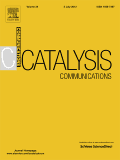
CATALYSIS COMMUNICATIONS
Accelerating Insights in Catalysis ScienceCATALYSIS COMMUNICATIONS is a prestigious journal published by Elsevier, focusing on advancements in the field of catalysis, an essential component of chemical engineering and process technology. With an ISSN of 1566-7367 and an E-ISSN of 1873-3905, this journal is dedicated to the rapid publication of original research and innovative findings that drive progress in catalysis. Recognized for its quality, CATALYSIS COMMUNICATIONS holds a Q2 ranking within the categories of Catalysis, Chemistry (miscellaneous), and Process Chemistry and Technology as of 2023, positioning itself in the upper tier of scholarly publications in its field. The journal has made significant contributions to the scientific community since its inception in 2000, with ongoing research until 2024. While it currently operates without an open-access option, the platform ensures rigorous peer review, maintaining high standards for publication. By engaging with the latest research, CATALYSIS COMMUNICATIONS serves as a vital resource for researchers, professionals, and students, fostering innovation and collaboration in chemical sciences.

TRANSACTIONS OF TIANJIN UNIVERSITY
Exploring innovative solutions through collaborative inquiry.TRANSACTIONS OF TIANJIN UNIVERSITY, published by SpringerNature, is a premier journal in the field of multidisciplinary research, boasting an impressive Q1 ranking and placing within the top 93rd percentile of its category according to Scopus. With an ISSN of 1006-4982 and E-ISSN of 1995-8196, this journal facilitates insightful and innovative contributions that span various disciplines, making it a vital resource for academics and professionals alike. Established in 2004, the journal continues to thrive with a commitment to advancing knowledge and fostering collaboration in scientific inquiry. TRANSACTIONS OF TIANJIN UNIVERSITY aligns with global research trends and offers a platform for the dissemination of high-quality research findings, promoting interdisciplinary approaches to solving complex problems. Located in China, its influence extends well beyond national borders, appealing to a diverse readership eager to explore the latest advancements and discussions in the multidisciplinary arena.

Theoretical and Experimental Chemistry
Fostering Insights in Theoretical and Experimental ChemistryTheoretical and Experimental Chemistry is a well-respected journal published by SPRINGER, focusing on both theoretical models and experimental methods within the field of chemistry. Operating since 1965, this journal has established a rich history of contributing to the scientific community, with a converged publication history extending through 2024. Although it currently holds a Q3 ranking in the Chemistry (miscellaneous) category and a Scopus Rank of #286 out of 408 in General Chemistry, its reputation continues to grow in the academic realm, as it provides a platform for both emerging and established researchers to share their findings. The journal does not operate on an open access model, yet it offers valuable insights into diverse chemical research that can benefit professionals and students alike. Located in New York, USA, at ONE NEW YORK PLAZA, SUITE 4600, the journal aims to bridge theoretical insights with experimental validation, fostering a comprehensive understanding of contemporary chemical challenges.
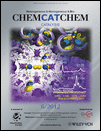
ChemCatChem
Pioneering Insights in Inorganic and Organic Chemistry.ChemCatChem is a leading international journal published by WILEY-V C H VERLAG GMBH that has been making significant contributions to the fields of catalysis, inorganic and organic chemistry, as well as physical and theoretical chemistry since its inception in 2009. With an established reputation for excellence, this journal holds commendable rankings in various categories, including Q1 in Inorganic Chemistry and Q1 in Organic Chemistry, demonstrating its pivotal role in advancing scientific knowledge and innovation. Notably, it has achieved a high Scopus ranking, securing 10th place out of 79 in Inorganic Chemistry, among others, showcasing its influence and quality. Although open access options are not available, the journal offers cutting-edge research articles, reviews, and insights that are vital for researchers, professionals, and students aiming to stay at the forefront of chemical science. With its address rooted in Weinheim, Germany, and convergence projected to continue until 2024, ChemCatChem remains a dynamic platform for disseminating vital advancements within the chemical community.
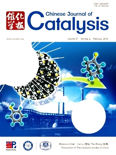
Chinese Journal of Catalysis
Exploring Breakthroughs in Chemistry and SustainabilityWelcome to the Chinese Journal of Catalysis, a prestigious publication dedicated to advancing the field of catalysis. Published by Elsevier, this journal showcases groundbreaking research and developments in the chemistry of catalysis, emphasizing applications that address global challenges in energy, environment, and sustainability. Since its inception in 1996, the journal has gained recognition, achieving a remarkable impact factor and ranking in the top quartile (Q1) of both Catalysis and Chemistry disciplines as of 2023. With a Scopus ranking of #5 in Catalysis and #14 in General Chemistry, it serves as a vital resource for academia and industry professionals alike. Through its rigorous peer-review process, the journal disseminates high-quality research that not only fosters collaboration among scientists but also encourages innovation. Access to the journal is available through institutional subscriptions, ensuring wide-reaching dissemination of critical findings. Positioned within the vibrant research community in China and beyond, the Chinese Journal of Catalysis plays a pivotal role in shaping the future of catalytic science.
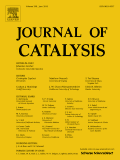
JOURNAL OF CATALYSIS
Advancing the Frontiers of Catalysis ResearchJOURNAL OF CATALYSIS, published by Academic Press Inc, Elsevier Science, is a premier peer-reviewed journal that has been at the forefront of research in catalysis since its inception in 1962. With an impressive impact factor and ranking in the top quartiles of both catalysis and physical and theoretical chemistry, the journal is highly regarded, currently holding the distinction of Q1 in both fields. The journal serves as a critical platform for disseminating groundbreaking research, innovative methodologies, and theoretical advancements, making it essential reading for researchers, professionals, and students alike. Although it does not operate under an open-access model, its robust content is accessible through institutional subscriptions, ensuring that significant findings in catalysis and related fields reach a wide audience. With convergence years extending to 2024, JOURNAL OF CATALYSIS continues to shape the discourse in catalysis and chemical engineering, encouraging scholarly exchange and collaboration worldwide.
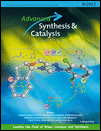
ADVANCED SYNTHESIS & CATALYSIS
Advancing knowledge in organic synthesis and catalysis.ADVANCED SYNTHESIS & CATALYSIS is a prestigious academic journal published by Wiley-VCH Verlag GmbH, based in Germany. This journal, with ISSN 1615-4150 and E-ISSN 1615-4169, plays a pivotal role in the fields of Chemistry and Chemical Engineering, earning commendable rankings such as Q2 in Catalysis and Q1 in Organic Chemistry in 2023. Its high impact factor and recognition—ranking #18 in both Organic Chemistry and Catalysis—further underscore its significance as a platform for groundbreaking research and innovative methodologies. Spanning from 1996 through 2024, ADVANCED SYNTHESIS & CATALYSIS aims to disseminate high-quality, cutting-edge studies related to synthetic processes and catalytic technologies, ensuring accessibility via their open access options. By fostering a vibrant scholarly community, this journal serves as an essential resource for researchers, professionals, and students dedicated to driving advancements in synthetic and catalytic chemistry.
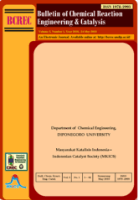
Bulletin of Chemical Reaction Engineering and Catalysis
Exploring Breakthroughs in Chemical Reaction DynamicsBulletin of Chemical Reaction Engineering and Catalysis is a distinguished open-access journal published by UNIV DIPONEGORO, focusing on pivotal advancements in the fields of chemical reaction engineering and catalysis. Since its inception in 2008, this journal has served as a vital platform for disseminating cutting-edge research, catering to a diverse readership that includes researchers, professionals, and students in chemical engineering and related disciplines. With its dedication to publishing valuable insights, the journal has been indexed in Scopus and boasts respectable rankings across various categories, including Q3 in Chemical Engineering (miscellaneous) and Q4 in Catalysis as of 2023. It continues to foster scholarly dialogue and collaboration by providing an accessible means for contributors to share their findings. Operating from Semarang, Indonesia, this journal underscores its commitment to advancing knowledge in chemical sciences, making it an essential resource for those engaged in the study and application of chemical processes.
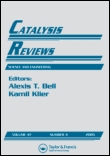
CATALYSIS REVIEWS-SCIENCE AND ENGINEERING
Pioneering Research and Insights in CatalysisCATALYSIS REVIEWS - SCIENCE AND ENGINEERING, published by Taylor & Francis Inc, is a leading journal in the field of catalysis, providing a vital platform for the dissemination of rigorous research and comprehensive reviews from 1968 to the present. With an impressive Q1 ranking in multiple categories, including Catalysis and Chemistry, this journal stands out as an essential resource for professionals, researchers, and students alike. Its high impact factor and esteemed Scopus ranks — including 3rd in Chemical Engineering: Process Chemistry and Technology — highlight the journal's influence and prestige within the scientific community. While primarily a subscription-based publication, the journal’s commitment to advancing the understanding of catalytic processes continues to foster innovation in various industrial applications, making it indispensable for anyone engaged in the fields of chemical engineering and applied chemistry.

JACS Au
Unleashing innovative ideas in analytical and organic chemistry.JACS Au, published by the American Chemical Society, is a premier open access journal dedicated to advancing research in the rapidly evolving fields of analytical chemistry, organic chemistry, and theoretical chemistry. Since its inception in 2021, JACS Au has quickly established itself as a leading platform for high-quality research, reflected in its Q1 rankings across multiple categories for 2023, including Organic Chemistry and Analytical Chemistry. The journal focuses on innovative methodologies and applications that drive the discipline forward, making it an essential resource for researchers, professionals, and students alike. With an impressive Scopus ranking, consistently placing in the top tiers of its categories, and offering a broad range of access options for its readership, JACS Au aims to foster collaboration and disseminate transformative ideas that impact the global scientific community. Exploring diverse topics within chemistry, this journal provides a vital conduit for sharing groundbreaking research and enhancing scientific dialogue.